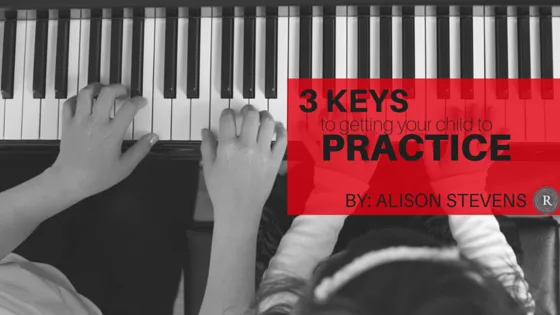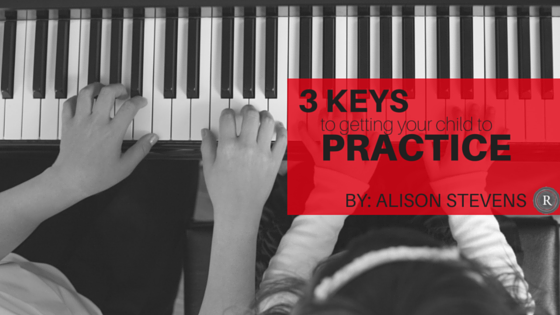3 Keys to Getting Your Child to Practice

3 Keys to Getting Your Child to Practice
By: Alison Stevens, ROOTS Piano Mentor & Parent
It’s inevitable. The conflict hits every family at some point. Schedules get busy, mastering a certain skill or concept causes frustration or boredom with the fundamentals creeps in and practicing becomes a battleground. The result? Students come to lessons unprepared and less than enthusiastic about the next half hour that lay in front of them.
Honestly, it’s just as uncomfortable for mentors to watch a student who isn’t prepared enter with a sense of dread, fumble through songs and have “that feeling” in the pit of their stomach as it is for them to endure it. We’ve all been there, unprepared and nervous, and it isn’t fun. Who wants to go through that on a weekly basis?
My parents had a major impact on my success and level of enjoyment I experienced with music lessons. It all started with how they tackled the practice problem.
Make practice a priority.
Growing up, my parents put practicing piano right up there with time spent at sports practices and doing chores. Dare I say it, they even gave it a higher ranking than “screen time” or social time. It was a line item on my job chart. Although I was heavily involved in children’s and youth choirs, sports and church activities, the piano practice was always a priority, right up there with everything else.
Unless it’s intentional and planned, practice time can become an afterthought, the thing that gets overlooked or pushed back until there’s just no more time left each day.
Try taking a look at your weekly schedule and figure out where you WILL fit in the time.
- Before school
- After school (as part of homework?)
- A requirement before TV or video games
- Right after dinner
- Two shorter time blocks if you don’t have one large block
It might look different each day. That’s OK! Wherever you decide, write practice times in just as you would any other activity. And protect them as you would any other activity.
Help your student set goals.
Now that you’ve got the when it’s time for the what. Whether I wanted to or not, my mom talked with me about what I was working on in the coming week and helped me plan it out. She was hands-on and involved. And I was a better student for it.
On the ride home from lessons:
- Have your student pull out their assignment sheet and help them break down the week’s practice work into smaller pieces for each day.
- If there are theory assignments, perhaps assign one specific practice time to tackle those.
- Break the song assignments into smaller chunks.
Goals are an important part of learning. Reaching them builds confidence and reinforces the value of hard work. If you aren’t comfortable or are unsure of what this might look like, talk to your mentor. We LOVE to talk to parents about helping our students be successful!
Make sure your student knows HOW to practice.
You’ve got the when, and the what. Now you need the how.
When one of my students is really struggling with a song, the first thing I ask is, “When you sit down to practice, are you taking this right hand and then left hand, mastering it line by line, or are you just attacking the whole thing at once?” Most students do not naturally know how to practice. They just want to be able to sit down and play, and that’s how they approach practice time.
Especially for parents with no musical background, this is an area where your mentor is a valuable resource. Knowing how to break down a song, what to focus on first, or beginning with an especially difficult section of a song first, are learned skills your mentor knows how to impart to your student.
Offer incentives when necessary.
As I mentioned, piano practice was included in my job chart. The expectations and rewards were the same for that as making my bed, cleaning up after myself and doing the dishes. Sometimes I was self-motivated; other times I needed a little extra push.
When needed, positive motivational incentives can help push a student through a hard practice seasons. Ideas might be:
- Including practice time in the regular job chart
- Attaching music practice to video game time – for every X minutes of practice, Y minutes of video game time are given
- Rockstar incentive – for going the extra mile, perhaps they’re given a music-related reward
Maybe there is a special song the student has been wanting to learn, but a few skills or theory building blocks lay in the way of being equipped to tackle that song. Purchasing that piece of music might be the incentive they need to keep going.
If you need additional ideas in this area, talk to your mentor.
By implementing these simple steps, students learn problem-solving skills, the value of setting and achieving goals and the importance of good work ethic – all skills that transfer to any area of life. They know you value their music lessons as something worth investing time and effort into. Weekly lessons are approached with a sense of confidence and left with the satisfaction of having been prepared and having done the best they can do.
A Note from our Music Program Manager:
“As a music department, we are passionate about coming alongside our mentors and parents to provide tools to help your student succeed.We’re really excited to introduce our “Rockstar Challenge.” Every student will be given a chart where they can earn stars for completing each of the following:
- practicing weekly
- completing their mentor challenge for the week
- having perfect attendance for a month
Once they’ve completed their chart by earning 20 stars, they will be able to pick out a fun reward from the treasure chest. This will be a fun way to encourage your student to practice while working towards a goal at the same time.
Let the Rockstar Challenge begin!”



